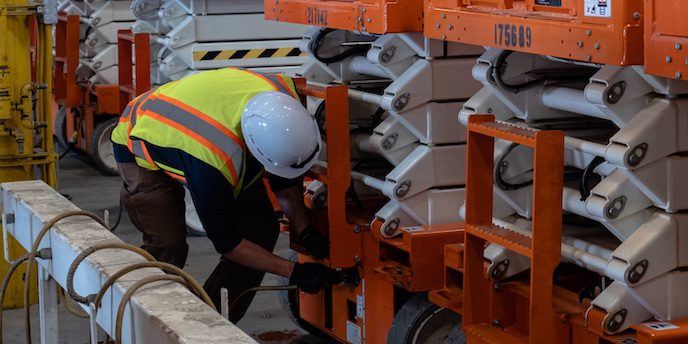Rental, Success Stories

By Bane Machinery
Rental Company


The purpose of fleet management is to oversee all fleet performance and maintenance to increase productivity and help a business run smoothly. Explore the top five benefits of implementing a fleet management solution here. You can also read about the meaning of fleet management.
Fleet management is the process of organizing and coordinating a fleet of vehicles, equipment and heavy machinery. This includes tracking and maintaining vehicles, managing drivers and scheduling repairs.
Fleet management is a critical part of many businesses, especially those that rely on transportation to get their products or services to customers. A well-run fleet can help a company save money and increase efficiency, while a poorly managed fleet can cost a business time and money.
Many different software applications and fleet management technology are available to help businesses with fleet management. Some companies outsource their fleet management to a third party, while others manage their fleet internally.
Fleet management is a critical function for any business in the construction industry, and it can have a number of benefits for a company’s fleet operations. Fleet management’s main benefits include vehicle tracking, improved safety, reduced costs, increased efficiency, and better customer service. With a well-managed fleet, businesses can enjoy these benefits and more.
Fleet management software is significantly automated. Automated reminders and email notifications allow you to have a systemized plan for vehicle maintenance, repairs, and timely fleet audits. This decreases the number of vehicles that need to be replaced due to irreparable damage, extends the fleet’s lifespan and saves on expenses.
It also reduces the burden on administrative staff to maintain repair schedules, minimizing the need to recruit extra personnel.
Fuel management is another vital element in reducing fuel costs. By calculating actual fuel consumption on specific routes or distances, fleet managers can monitor which vehicles use more fuel or what driving techniques lead to fuel wastage.
If you work in the logistics and transportation industry, you understand how important it is to keep fleets and drivers safe. In all weather conditions, driver safety must be a top priority. A fleet management system with a comprehensive driver monitoring system can help you effectively address this issue. These fleet management systems are designed to notify and alert drivers of common mistakes that could lead to accidents.

Customers often stop using a brand because of its poor delivery service. A fleet management system can help optimize routes, reduce ETAs, and ensure error-free deliveries. As fleet managers have real-time updates on traffic and reasons for transit delays, they can prioritize deliveries to important customers.
Furthermore, drivers can see customer locations on their dashboards and optimize their work hours based on estimated delivery times. This has two benefits: fleet managers can focus on other important issues, and drivers can work according to delivery requirements.
As a fleet manager, one of your priorities is maintaining your fleet on a tight budget. Maintaining fleet vehicles requires comprehensive planning and execution of the highest order. However, with a fleet management system, you can devise preventative maintenance schedules based on parameters like vehicle size, miles traveled and weather conditions.
In addition, the system will also help you track vehicle downtime and its root cause. Based on these data points, the fleet management system will devise a schedule that prioritizes maintenance. Thus, an initial investment in fleet management software will eventually reduce costs more than what is spent on efficient maintenance.

It becomes difficult for fleet managers to keep track of drivers’ performance. In many cases, poor driving techniques reduce a fleet’s lifespan and cause fatal accidents.
Telematics offers viable solutions to monitor driving patterns and improve drivers’ behavior easily. For instance, GPS tracking is an essential element of telematics. It can help managers and dispatchers track the location, speed, driving methods (such as harsh braking, excessive idling, and cornering), and vehicle diagnostics of every driver.
With this data, fleet managers can plan their strategies to lower risks and reinforce durability.
Trackunit Go helps businesses monitor their fleets in near real-time. By providing accurate location updates, you can feel confident that your fleet operations are on schedule and under control. Trackunit Go offers a variety of features to streamline your processes, such as temperature monitoring and tamper-proofing. With our simple and easy-to-use solution, you can track your fleet, manage your expenses, and ultimately increase your operational efficiency.

